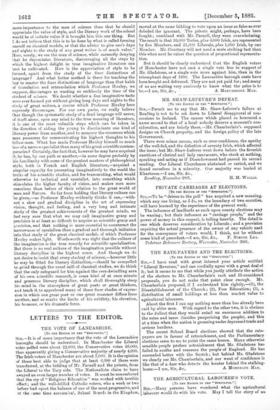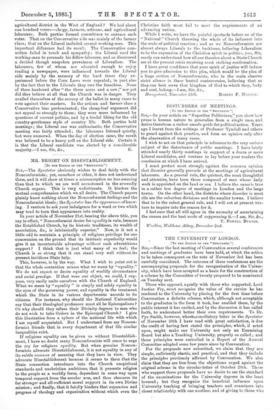THE AGRICULTURAL LABOURER'S VOTE. LTo THE EDITOR OF THE "SPECTATOR."]
Stn,—Many persons have wondered what the agricultural labourer would do with his vote. May I tell the story of an
agricultural district in the West of England ? We had about one hundred voters—clergy, farmers, artisans, and agricultural labourers. Both parties formed committees to canvass each voter. That on the Conservative s'de was mainly of the farmer class; that on the Liberal included several working-men. This important difference had its result. The Conservative com- mittee failed in touch and sympathy ; the Liberal used the working-man to persuade his fellow-labourer, and so discovered a decided though unspoken prevalence of Liberalism. The labourers, few of whom are educated enough to enjoy reading a newspaper, were influenced towards the Liberal side mainly by the memory of the hard times they ex- perienced before the Corn Laws were repealed; in part also by the fact that to the Liberals they owe the franchise. None of them hankered after " the three acres and a cow ;" nor yet did they believe at all that the Church was in danger. They availed themselves of the secrecy of the ballot in many cases to vote against their masters. In the artisan and farmer class a Conservative bias predominated; the cheap-loaf argument did not appeal so strongly to them ; they were more influenced by questions of current politics, and by a feudal liking for the old country-gentleman style of country life. Both parties held meetings ; the Liberal one was enthusiastic, the Conservative meeting was fairly attended ; the labourers listened quietly, but were unmoved. When the day of election came, the result was believed to be a heavy poll on the Liberal side. Certain it is that the Liberal candidate was elected by a considerable







































 Previous page
Previous page